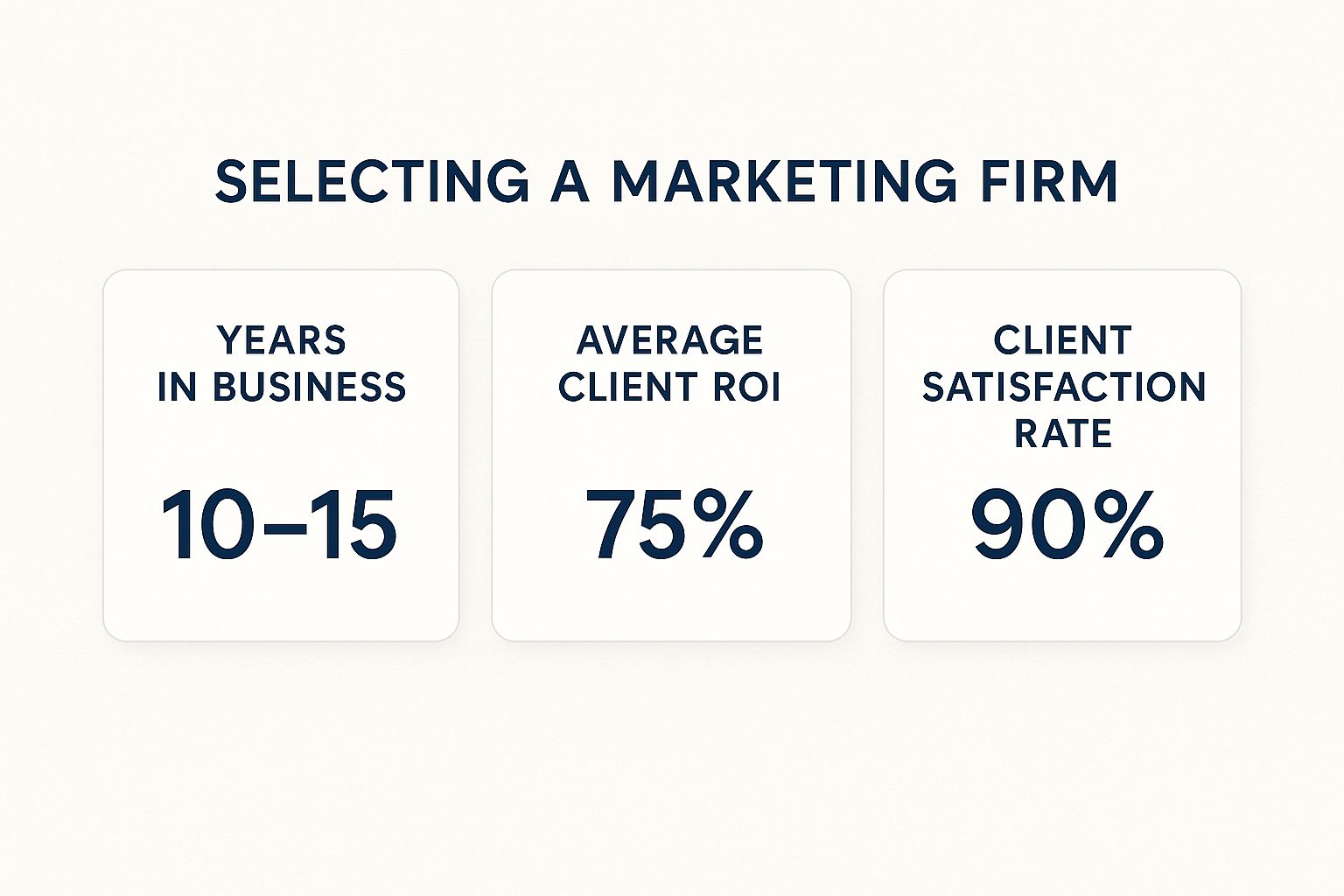For any attorney serious about growth, bringing in a specialized marketing firm isn’t just a good idea—it’s a necessity. These agencies get the legal world. They understand the ethical tightropes you walk and the specific mindset of someone looking for legal help, ensuring you don’t just get attention, but build the trust that turns a searcher into a signed client.Partner with leading marketing firms for attorneys to increase visibility, attract clients, and dominate your local legal market.
Why Your Firm Needs a Legal Marketing Specialist
Relying on word-of-mouth to grow your practice in today’s market is like leaving your firm’s future up to pure chance. It’s a completely passive approach in a world that rewards being seen. While a solid referral pipeline is great to have, it’s unpredictable and almost never enough to fuel the kind of consistent growth that builds a lasting firm.
This is exactly where a strategic partnership with a top-tier marketing firm for attorneys makes all the difference. You’re not just hiring someone to run a few ads. You’re bringing in a specialist who lives and breathes the unique dynamics of your profession.
Navigating a Complex Landscape
General-purpose marketing agencies almost always miss the mark with law firms. Why? They just don’t get the nuances. They might be able to drive some traffic to your site, but they often fail to bring in qualified leads because they overlook what truly matters:
- Ethical Compliance: A legal-focused agency knows the bar association’s advertising rules cold. They protect your firm from the kind of costly compliance missteps that a generalist wouldn’t even know to look for.
- Client Trust Signals: They get what a potential client in crisis needs to see. Whether it’s someone just in an accident or a couple facing a messy divorce, it’s not about flashy gimmicks. It’s about projecting authority, empathy, and confidence.
- Competitive Intelligence: The legal space is a battlefield. A specialist already knows what your competitors are doing and can position your firm to win market share for the specific, high-value practice areas you want to own.
“Clients don’t hire you because of your awards. They hire you because they feel confident you can solve their problem. Awards can suggest credibility, but they won’t close the deal by themselves.”
From Invisibility to Authority
Let’s get practical. Imagine a small personal injury firm stuck on page five of Google. A generic agency might throw some broad, ineffective tactics at the wall to see what sticks.
A legal marketing specialist, on the other hand, comes in with a scalpel. They’ll target the long-tail keywords people actually use when searching for specific case types, dominate the local map pack with pinpoint SEO, and create content that directly answers the urgent questions your potential clients are typing into their phones at 2 a.m.
The modern legal client is online, and savvy firms are meeting them there. The data is clear: 83% of law firms now outsource their marketing to specialized teams because they know expertise is the only thing that works. This isn’t a fad; it’s a fundamental shift. If you want to dive deeper, you can review more legal marketing statistics to see just how quickly firms are adapting.
At the end of the day, partnering with a legal marketing expert is a foundational business investment. It’s the difference between sitting by the phone hoping it rings and building a predictable, powerful system for client acquisition that secures your firm’s future.
Defining Your Marketing Goals and Budget

Before you even think about interviewing marketing firms for attorneys, you have to get your own house in order. Seriously. Without a clear internal roadmap, you’re just throwing money at a problem without knowing what a solution even looks like.
Hiring an agency without defined targets is a recipe for disaster. It’s how you end up wasting months of your time and a significant chunk of your budget on a strategy that was never pointed in the right direction to begin with.
So, let’s start by getting past vague ambitions like “I need more clients.” That’s not a goal; it’s a wish. Real success comes from setting specific, measurable, achievable, relevant, and time-bound (SMART) goals. This simple framework is what turns a fuzzy idea into an actionable battle plan.
From Vague Ideas to Specific Targets
Instead of talking in generalities, you need to think in terms of tangible outcomes. Your goals should be so crystal clear that any marketing partner you speak with can immediately grasp what a “win” looks like for your practice.
Let’s look at a few practical examples:
- We need to increase qualified case inquiries for our family law practice by 20% within the next 12 months.
- Our goal is to achieve a top-three ranking on Google Maps for “personal injury attorney [Your City]” within six months.
- We want to reduce our firm’s reliance on referrals by generating at least 15 new leads per month directly from our website by the end of Q4.
See the difference? Each one has a number, a deadline, and a laser-sharp focus. This level of detail is non-negotiable. It’s what allows you to hold an agency accountable and actually measure the return on your investment. Figuring out how to market a law firm effectively starts right here, with these foundational benchmarks.
Setting a Realistic Marketing Budget
Once you know what you’re aiming for, you can figure out what it’s going to cost. A good rule of thumb is to allocate between 5% and 15% of your firm’s gross revenue to marketing.
A brand-new practice in a cutthroat field like personal injury might need to push closer to that 15% mark just to get noticed. On the other hand, an established firm with a rock-solid referral network might do just fine at the lower end of that range.
It helps to think about your budget in two distinct buckets:
- Fixed Costs: These are your predictable, recurring expenses. Think of an agency’s monthly retainer, software subscriptions, or content creation packages. You know what this bill will be every month.
- Variable Costs: This is your ad spend for platforms like Google Ads or social media. This part of the budget needs to be flexible. You want the ability to ramp it up when a campaign is crushing it or pull back if something isn’t working.
Having this financial clarity before you start taking calls from agencies is absolutely crucial. It empowers you to have productive, no-nonsense conversations, quickly weed out firms that are out of your price range, and find a partner who can deliver the results you need within a budget you can actually sustain.
What a Top Legal Marketing Partner Actually Does
When you start looking for a marketing firm, it’s easy to get buried in proposals full of jargon and vague promises. To find a partner who will actually move the needle, you have to cut through the fluff and focus on the core services that bring in new clients for law firms.
Let’s be clear: not all marketing is created equal. A generic agency might talk a good game about SEO, but legal SEO is a completely different animal. It’s not just about trying to rank for “car accident lawyer.” It’s about methodically building the E-E-A-T (Experience, Expertise, Authoritativeness, and Trustworthiness) signals that Google absolutely requires for high-stakes topics like legal advice.
This means your marketing partner needs to do more than just stuff keywords onto a page. They need to create a digital presence that screams credibility and demonstrates deep legal expertise.
Legal-Specific SEO and Content Creation
Any decent marketing firm needs to understand how potential clients are actually searching for legal help. It’s often panicked, specific, and local. An effective SEO strategy for attorneys has to be layered.
- The Technical Foundation: Is your website fast, mobile-friendly, and easy for search engines to crawl? If not, nothing else matters.
- Owning Your Backyard: Dominating the local “map pack” is critical. This is where a massive number of clients find their lawyers, especially for urgent needs.
- Answering Real Questions: Your content—blog posts, FAQs, practice area pages—needs to answer the exact questions your ideal clients are typing into Google. This builds trust long before they ever decide to make a call.
The infographic below breaks down some key metrics you can use to quickly gauge an agency’s stability, performance, and how happy their clients are.

As the data suggests, firms that have been around the block, can show a real ROI, and have happy clients are almost always the safest bet for growing your practice.
Paid Ads That Don’t Just Burn Cash
Pay-per-click (PPC) ads, especially on Google, can be a firehose for immediate leads—if they’re managed by someone who knows what they’re doing. The legal field is one of the most competitive and brutally expensive PPC arenas out there. A generalist agency will torch your budget in a week.
A truly skilled legal marketing agency isn’t just running ads. They’re obsessing over your Cost Per Lead (CPL) and, more importantly, your Cost Per Signed Case. They get the nuances of legal ad copy and know how to navigate the complex compliance rules set by bar associations.
This kind of specialized knowledge is non-negotiable. With 96% of potential clients now starting their search for a lawyer online, digital is the primary battlefield. A stunning 65% of legal marketing budgets are now dedicated to digital channels, but a huge chunk of that money is wasted when firms hire agencies that don’t live and breathe the legal industry.
Managing Your Entire Digital Footprint
SEO and PPC are the big guns, but they don’t work in a vacuum. A holistic approach is what separates the great firms from the good ones. The best marketing firms for attorneys will also manage your firm’s entire digital footprint.
This includes things like reputation management—actively encouraging and responding to online reviews—and making sure your listings on Avvo, FindLaw, and other legal directories are accurate, complete, and optimized.
To give you a clearer picture of what you should be looking for, this table breaks down the essential services, what they do, and what you should ask a potential partner about each one.
Core Services Offered by Legal Marketing Firms
| Service | What It Does for Your Firm | Key Question to Ask |
|---|---|---|
| Legal SEO | Improves your organic visibility on Google for high-intent client searches, building long-term authority and lead flow. | “Can you show me case studies of how you’ve ranked a firm like mine for competitive local keywords?” |
| PPC Management | Drives immediate, qualified leads to your website through targeted ads on platforms like Google Ads and social media. | “What’s your process for optimizing campaigns to lower our Cost Per Signed Case, not just Cost Per Click?” |
| Content Marketing | Establishes your firm as an expert by creating articles, guides, and FAQs that answer your clients’ most pressing questions. | “Who writes your content? Are they familiar with legal topics and writing for E-E-A-T?” |
| Website Design & Dev | Creates a professional, fast, and secure “digital front door” that is designed to convert visitors into consultations. | “How do you ensure the websites you build are compliant with Core Web Vitals and ADA accessibility standards?” |
| Reputation Management | Monitors, manages, and encourages online reviews to build social proof and trust with potential clients. | “What’s your strategy for handling a negative review on Google or Avvo?” |
| Local Service Ads (LSAs) | Positions your firm at the very top of Google for local searches, often generating high-quality phone call leads. | “How do you help your clients get and maintain the ‘Google Screened’ badge for their LSA campaigns?” |
Ultimately, you’re not just buying a list of services. You’re hiring a partner to execute a cohesive plan. To see how these pieces fit together, check out our guide on essential law firm marketing strategies. The right agency will build a powerful, interconnected system that consistently attracts, engages, and converts the clients you want.
How to Vet and Qualify Potential Marketing Firms

Choosing a marketing partner is one of the biggest financial calls your firm will ever make. Getting it wrong doesn’t just waste money; it can stall your growth for years. A solid vetting process is your only real defense against a slick sales pitch that promises the world but delivers very little.
The first move? Look right past the polished testimonials an agency features on its homepage. They’re a fine starting point, but let’s be honest, they’re curated to show only the absolute best outcomes. The real story comes from digging a lot deeper.
Analyze Their Case Studies
Any agency worth its salt will have detailed case studies ready to go. Don’t just skim them—dissect them. You need to find examples from firms that look like yours in terms of practice area, size, and your local market.
A portfolio packed with national e-commerce brands means nothing to your local personal injury practice. You’re looking for tangible proof that they get the unique hurdles of marketing for lawyers.
As you review their work, ask yourself:
- Do they show real results in my specific practice area? Marketing a family law firm is a completely different ballgame from marketing a criminal defense practice.
- Are the metrics actually meaningful? Vague claims like “increased website traffic” are a major red flag. You want to see hard numbers, like “a 45% increase in qualified leads” or “we cut their cost-per-signed-case by 22%.”
- Is the timeline believable? Steer clear of anyone promising overnight success. Real, sustainable SEO and authority-building simply take time.
Speak with Real Client References
This part is completely non-negotiable. A reputable agency will have no problem handing over a list of current or former clients for you to talk to. If they hesitate or start making excuses, that’s your cue to walk away.
Once you get those references, don’t just ask if they were “happy.” Ask the tough questions that get to the heart of the partnership:
- How responsive is the agency when you have questions or concerns?
- Do their reports give you clear, actionable insights, or are they just a confusing data dump?
- Did they actually deliver on the goals you set out in the initial agreement?
- What was the onboarding process like? Was it smooth or a nightmare?
The best marketing firms for attorneys are transparent and confident in their work. They’ll let you speak directly with their clients because they have nothing to hide. This single step will tell you almost everything you need to know.
Scrutinize Their Ethical Approach
In the legal world, compliance isn’t just a good idea—it’s everything. Your marketing partner absolutely must have a deep, demonstrable understanding of your state bar’s advertising rules. This is exactly where many generalist agencies fail, putting your firm at serious risk.
Bring up their approach to ethical guidelines directly. Ask them how they make sure ad copy, website content, and even client testimonials stay compliant. It’s also smart to brush up on the regulations yourself; this guide to ethical attorney advertising in California is a great resource.
The global legal services market is on track to hit $1,006.53 billion by 2028, which shows just how fast the industry is growing. With that growth comes fierce competition, highlighting the need for specialized partners who know how to navigate this complex environment. A firm that puts ethical compliance first isn’t just a vendor; they’re a partner invested in your sustainable growth.
Making the Final Decision and Onboarding Your Agency

You’ve done the legwork, vetted your options, and narrowed it down to a few strong contenders. It’s tempting to just look at the price tag, but the final choice should never come down to who’s cheapest. It’s about finding the agency that offers the most strategic value and feels like a genuine extension of your team.
Look past the monthly retainer. A cheap proposal that just lists a few services is far less valuable than a comprehensive plan that shows you exactly how each tactic will help you sign more high-value cases. The right partner will immediately shift the conversation to your return on investment.
Negotiating the Right Partnership Terms
Before you sign on the dotted line, it’s time to nail down the specifics. A solid contract protects both you and the agency, setting crystal-clear expectations from the get-go. Don’t be afraid to negotiate terms that create transparency and hold everyone accountable.
Make sure your agreement clearly defines:
- Performance Metrics: What specific KPIs will you be tracking? Insist on metrics that actually matter to your bottom line, like Cost Per Qualified Lead or Cost Per Signed Case, not vanity metrics like website traffic.
- Reporting Cadence: How often will you get reports, and what will they look like? Monthly reports with clear analysis and actionable next steps should be the absolute minimum.
- Scope of Work: The contract needs to spell out every single service included. This prevents “scope creep” and protects you from surprise charges down the road.
- Termination Clause: What happens if the partnership isn’t working out? A fair contract should include a reasonable out, like a 30 or 60-day notice period.
A strong contract is the foundation of a healthy agency relationship. It transforms a vendor agreement into a strategic partnership by aligning both parties around shared, measurable goals and establishing clear rules of engagement.
This stage is absolutely crucial for building a productive, long-term relationship with one of the top marketing firms for attorneys.
Kicking Off a Successful Onboarding Process
Once the ink is dry, the first 90 days are make-or-break. A smooth onboarding process sets the tone for the entire partnership and gets your new agency up to speed quickly. A messy start creates friction and delays results.
To make sure the transition is seamless, you need to establish a few key pillars right away.
- Designate a Primary Point of Contact: Assign one person from your firm to be the main liaison. This keeps communication clean and prevents you from sending conflicting feedback.
- Establish a Communication Rhythm: Agree on a schedule for regular check-in calls. A weekly or bi-weekly sync is pretty standard to review progress, talk strategy, and tackle any roadblocks.
- Co-Develop a 90-Day Action Plan: Don’t just wait for them to send you a plan. Work with the agency to build a detailed roadmap for the first three months. This should outline initial priorities, key deliverables, and specific milestones.
A strong start builds the momentum you need for a profitable, long-term partnership. With a well-defined plan, everyone is focused on the same thing: getting more clients for your firm. For more ideas on that front, our guide on how to get clients offers additional strategies that will complement your new agency’s efforts.
A Few Common Questions About Hiring a Law Firm Marketing Agency
It’s completely normal to have questions before you commit to a marketing partner. In fact, it’s a good sign. It means you’re taking this investment seriously.
Let’s walk through some of the most common questions we hear from attorneys. Getting these answers sorted out now will help you move forward with confidence and find a true partner, not just another vendor.
How Much Should We Really Budget for Marketing?
You’ll often hear the guideline of spending 5% to 15% of your firm’s gross revenue on marketing. But let’s be honest, that’s a huge range.
A brand-new firm or a practice in a brutally competitive market—think personal injury in a major city—will likely need to push toward the higher end of that range just to get noticed. On the flip side, a well-established firm with a steady stream of referrals might do just fine closer to the 5% mark.
The most critical shift in mindset is to stop thinking of marketing as an expense and start treating it as a strategic investment in growth.
A great agency won’t just give you a budget; they’ll help you build one based on what matters most: your target cost to sign a new case. This turns the conversation from “how much are we spending?” to “what’s our predictable return?”
What’s the Difference Between a Generalist and a Legal-Specific Agency?
This is a big one, and it boils down to two things that can make or break your firm: compliance and client acquisition.
First, a specialized legal marketing firm lives and breathes the strict advertising ethics rules set by state bar associations. They know what you can and can’t say, which keeps your campaigns compliant and your license safe. A generalist agency, even with the best intentions, probably won’t have a clue about these nuances.
Second, a specialist understands the unique psychology of someone looking for a lawyer. They know what a person in crisis searches for, what kind of content builds trust, and which keywords actually drive high-value cases for your specific practice area.
A generalist might get you website traffic. A specialist brings you qualified leads who are ready to talk. If you’re looking for more actionable ideas, our guide on attorney marketing tips offers some great insights.
What Marketing Metrics Actually Matter?
It’s incredibly easy to get mesmerized by “vanity metrics” like website traffic or how many followers you have on social media. While they aren’t totally useless, they don’t tell you anything about the financial health of your firm.
The metrics that truly matter are the ones tied directly to your bottom line.
Here are the big three to focus on:
- Cost Per Lead (CPL): This tells you exactly how much you’re paying for every phone call or form submission. No fluff.
- Cost Per Acquisition (CPA): This is the holy grail. It’s your total marketing spend to sign a new client, telling you if your marketing is actually profitable.
- Marketing Qualified Leads (MQLs): This is your quality filter. It tracks how many inquiries actually fit your ideal case profile, separating the real opportunities from the noise.
These numbers give you an unfiltered, honest look at your marketing ROI. They tell you if your investment is truly paying off.
At Case Quota, we build data-driven marketing strategies that deliver real, measurable results for law firms. If you’re ready to stop guessing and start building a predictable system for signing new clients, visit us at https://casequota.com to see how we can help your firm grow.
